Arsenal and Liverpool hit by the painful reality of a title race in the Man City era

It’s a feeling that both Arsenal and Liverpool have felt a lot, at key moments of the last few seasons. Even Mikel Arteta admitted his dressing room was “frustrated and sad” after the 2-0 defeat to Aston Villa, which was rather different to how he usually responds to such setbacks. Part of the Spaniard’s approach is to always look forward, in order to prevent any doubt seeping into his team. It did lead to an obvious question in a fairly terse press conference, as to whether there is now a danger of Arsenal’s season fizzling out.
“If one result is going to do that, then we are not strong enough,” Arteta responded. “That’s very simple.”
It is on one level, but the actual situation is a lot more complicated than that.
On the face of it, it might even seem absurd to be talking in such terms given what the table looks like. Liverpool and Arsenal are still just a point behind Manchester City. The actual gap is the same as it was before this weekend, when almost everyone was breathlessly talking about a potential three-way title race.
Precisely the problem, however, is that this “one result” – in Liverpool’s case, a 1-0 home defeat to Crystal Palace – is actually about much more than one result. It’s about the last six years and what everyone knows can now happen.
Much of the excitement around this title race was invigorated by the way both Arsenal and Liverpool seemed to be these emotional waves, and City were suddenly vulnerable. Arteta’s side looked fortified by the experience of last season, and hadn’t lost a league game in this calendar year. Liverpool were emotionally propelled by Jurgen Klopp’s farewell, and it inspired this relentless ability for comebacks; as if they could constantly overcome anything. At least one always stayed ahead of City, who were conceding so many more goals than they usually do. It was as if the champions were giving everyone a chance, which was illustrated in how one of Liverpool or Arsenal persistently stayed ahead.
No more.
City have now scored 13 goals in three games, and it already looked ominous before this weekend’s games. It was at exactly this point last season that they went up a level, from just beating opposition to destroying them.
That’s why it’s as if these double-defeats came at exactly the wrong time. They have a double effect, especially psychologically. That’s why it’s about more than any one result.


It’s hard not to feel that both challengers need the belief that they can actually beat City to stay stronger for longer; to foster a different momentum. That’s after all what it takes against this kind of machine. That’s what pushed Liverpool to 99 points in 2019-20.
Now, both Liverpool and Arsenal are feeling that similar sense of deflation. It’s not just that they lost, it’s that those defeats have allowed City to go ahead of them.
That is a huge psychological shift.
“We knew this moment could come,” Arteta said, rather conspicuously. Both Liverpool and Arsenal will see the new order of the table and inevitably think of what has happened in the last few seasons. City don’t tend to drop points from here on in.
In the three close races they have actually been in, Pep Guardiola’s side have only dropped two points when the title has been up for grabs after the 32nd match. So that’s one draw in 16. And the only reason it’s not 18 is because they won the league by game 37 last year.
Neither Arsenal nor Liverpool have that record to fall back on. They don’t know they can do that. They hope they can, of course, but that’s why the psychology of all this is so important. There’s a reason mind games have been part of the language of title races.

That confidence has now been dented at a crucial point.
These two defeats have also done something else, that is potentially symbolic, and influential. Neither Arsenal nor Liverpool can get over 90 points. The most they can go to is 89. That’s a small thing that may not be relevant but does speak to the sort of standards they’re up against.
It is that inherent knowledge City have the capacity to always go one further. That has after all been the story of the modern era.
This state project has almost industrialised winning. Guardiola has assembled a squad that knows exactly what he wants from them. The control is near total, especially at this point of the season. Ever since starting at Barcelona in 2008, Guardiola has insisted his staff physically condition his side so they come to a peak in April. We saw that last season. We may be seeing it now.
It mirrors the double effect of this game. When challengers go into big title-race matches, it is not just the pressure of having to win to keep up. It is the pressure of knowing City are unlikely to relent.
That can make teams panic, and we’ve certainly seen a lot of that from Arsenal and – especially – Liverpool in the last few hundred minutes of football or so.
This isn’t to absolve them of their own failings, of course. Liverpool shouldn’t be finishing like that, or be so lax at the back. Arsenal were so unusually flat in the second half against Aston Villa.

They can only look to themselves for a lot of that.
The potential consequences, however, point to the wider context of City’s potency.
It is why these games feel so seismic, because twists are now so unlikely. This isn’t like the 1990s, when even Sir Alex Ferguson’s Manchester United could lose at home to Derby County and still win the title. The game has changed.
You can’t really afford home slip-ups, especially against mid-table sides, because City won’t offer that.
None of this is to say this is done, of course. It’s merely about how difficult it is.
Huge achievements are still attainable. Psychological shifts are still possible.
The fixture list, which is notionally more forgiving for City, may even play a part there.
By the time City play their next Premier League game, both Arsenal and Liverpool will have played twice.
That could have considerably changed the face of the table again. That could change the mindset again. Both might be back out in front, albeit with more games played.
Arteta, meanwhile, spoke of how Arsenal “have a beautiful opportunity” as the club looks to reach the semi-finals of the Champions League for the first time in 14 years.
The Bayern Munich second leg on Wednesday, he said, “couldn’t come in a better moment”.
Maybe that’s true.
What is beyond doubt, however, is neither Liverpool nor Arsenal can afford any more slips. One more bad result may really do it.

 Yahoo Sport
Yahoo Sport 



































































